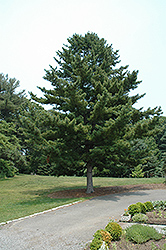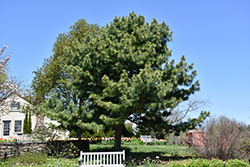>> Home
Height: 40 feet
Spread: 25 feet
Sunlight:
![]()
Hardiness Zone: 3b
Description:
A very picturesque pine at maturity, with irregularly spreading and arching branches and open habit; interesting reddish-brown bark under the peeling gray bark ; best in full sun with lots of room to spread
Ornamental Features
Korean Pine is primarily valued in the landscape for its decidedly oval form. It has attractive dark green foliage with bluish-green stripes. The needles are highly ornamental and remain dark green throughout the winter. The shaggy gray bark is extremely showy and adds significant winter interest.
Landscape Attributes
Korean Pine is an open evergreen tree with a strong central leader and a shapely oval form. Its average texture blends into the landscape, but can be balanced by one or two finer or coarser trees or shrubs for an effective composition.
This is a relatively low maintenance tree. When pruning is necessary, it is recommended to only trim back the new growth of the current season, other than to remove any dieback. It has no significant negative characteristics.
Korean Pine is recommended for the following landscape applications;
- Accent
- Shade
Planting & Growing
Korean Pine will grow to be about 40 feet tall at maturity, with a spread of 25 feet. It has a low canopy with a typical clearance of 4 feet from the ground, and should not be planted underneath power lines. It grows at a slow rate, and under ideal conditions can be expected to live to a ripe old age of 120 years or more; think of this as a heritage tree for future generations!
This tree should only be grown in full sunlight. It prefers dry to average moisture levels with very well-drained soil, and will often die in standing water. It is not particular as to soil type or pH. It is quite intolerant of urban pollution, therefore inner city or urban streetside plantings are best avoided. This species is not originally from North America.

